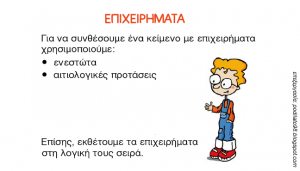Difference between revisions of "Language/Modern-greek-1453/Grammar/Methods-of-Argument"
| Line 10: | Line 10: | ||
==='''1''' . I start with:=== | ==='''1''' . I start with:=== | ||
'''Η άποψή μου είναι''' ...: My opinion is ...: | *'''Η άποψή μου είναι''' ...: My opinion is ...: | ||
'''Η γνώμη μου είναι''' ...: in my estimate | *'''Η γνώμη μου είναι''' ...: in my estimate | ||
'''Πιστεύω ότι''' ...: I believe ... | *'''Πιστεύω ότι''' ...: I believe ... | ||
'''Νομίζω ότι''' ...: I think so ... | *'''Νομίζω ότι''' ...: I think so ... | ||
'''Θεωρώ πως''' ...: I consider that .. | *'''Θεωρώ πως''' ...: I consider that .. | ||
==='''2 .''' You can add elements=== | ==='''2 .''' You can add elements=== | ||
'''γιατί :''' why | *'''γιατί :''' why? | ||
'''επειδή :''' because | *'''επειδή :''' because | ||
'''αφού.'''.. since | *'''αφού.'''.. since | ||
==='''3 .''' I put other ideas in parallel or to compare to express my feelings:=== | ==='''3 .''' I put other ideas in parallel or to compare to express my feelings:=== | ||
'''Είναι κρίμα να''' ...: It's a shame to ... | *'''Είναι κρίμα να''' ...: It's a shame to ... | ||
'''Είναι άσχημο''' ...: It's ugly | *'''Είναι άσχημο''' ...: It's ugly | ||
'''Είναι ευχάριστο''' ... It's nice ... | *'''Είναι ευχάριστο''' ... It's nice ... | ||
'''Είναι σπουδαίο''' ... It's great ... | *'''Είναι σπουδαίο''' ... It's great ... | ||
'''Είναι ασήμαντο''' ... It is insignificant ... | *'''Είναι ασήμαντο''' ... It is insignificant ... | ||
'''Δε συμφωνείτε ότι''' ...; Don't you agree that ...? | *'''Δε συμφωνείτε ότι''' ...; Don't you agree that ...? | ||
==='''4.''' To determine that what we believe continues and is still sustainable, it is important to use the present indicative=== | ==='''4.''' To determine that what we believe continues and is still sustainable, it is important to use the present indicative=== | ||
| Line 46: | Line 46: | ||
==='''5 .'''I conclude : === | ==='''5 .'''I conclude : === | ||
'''Γι’ αυτό...''' So... | *'''Γι’ αυτό...''' So... | ||
'''Έτσι...''' Therefore... | *'''Έτσι...''' Therefore... | ||
'''Κατά συνέπεια'''... '''as a consequence''' | *'''Κατά συνέπεια'''... '''as a consequence''' | ||
'''δε συμφωνείτε ότι'''... you don't agree that .. | *'''δε συμφωνείτε ότι'''... you don't agree that .. | ||
'''είναι κρίμα να…..''' it's a shame to ... | *'''είναι κρίμα να…..''' it's a shame to ... | ||
'''είναι άσχημο''' … It's ugly… | *'''είναι άσχημο''' … It's ugly… | ||
'''ευχάριστο…''' pleasant… | *'''ευχάριστο…''' pleasant… | ||
'''σπουδαίο''' … Great … | *'''σπουδαίο''' … Great … | ||
'''ασήμαντο.'''.. insignificant ... | *'''ασήμαντο.'''.. insignificant ... | ||
| Line 72: | Line 72: | ||
==='''1''' . Je débute par :=== | ==='''1''' . Je débute par :=== | ||
'''Η άποψή μου είναι'''... : Mon opignion est... : | *'''Η άποψή μου είναι'''... : Mon opignion est... : | ||
'''Η γνώμη μου είναι'''... : à mon avis | *'''Η γνώμη μου είναι'''... : à mon avis | ||
'''Πιστεύω ότι...''' : Je pense que... | *'''Πιστεύω ότι...''' : Je pense que... | ||
'''Νομίζω ότι...''' : Je crois que... | *'''Νομίζω ότι...''' : Je crois que... | ||
'''Θεωρώ πως'''...: Je considère que . | *'''Θεωρώ πως'''...: Je considère que . | ||
==='''2 .''' Puis j'ajoute des éléments :=== | ==='''2 .''' Puis j'ajoute des éléments :=== | ||
'''γιατί :''' Pourquoi | *'''γιατί :''' Pourquoi | ||
'''επειδή :''' car, parce que | *'''επειδή :''' car, parce que | ||
'''αφού.'''.. : Puisque | *'''αφού.'''.. : Puisque | ||
==='''3 .''' Je mets d'autres idées en parallèle ou pour comparer ου d'exprimer mes sentiments :=== | ==='''3 .''' Je mets d'autres idées en parallèle ou pour comparer ου d'exprimer mes sentiments :=== | ||
'''Είναι κρίμα να...''' : C'est dommage de... | *'''Είναι κρίμα να...''' : C'est dommage de... | ||
'''Είναι άσχημο...:''' C'est moche | *'''Είναι άσχημο...:''' C'est moche | ||
'''Είναι ευχάριστο...''' C'est agréable ... | *'''Είναι ευχάριστο...''' C'est agréable ... | ||
'''Είναι σπουδαίο'''... C'est super... | *'''Είναι σπουδαίο'''... C'est super... | ||
'''Είναι ασήμαντο'''... C'est insignifiant... | *'''Είναι ασήμαντο'''... C'est insignifiant... | ||
'''Δε συμφωνείτε ότι...;''' N'êtes-vous pas d'accord que ...? | *'''Δε συμφωνείτε ότι...;''' N'êtes-vous pas d'accord que ...? | ||
==='''4 .''' Pour déterminer dont ce que nous croyons continue et il est encore durable, c'est important l'emploi d'indicatif présent. === | ==='''4 .''' Pour déterminer dont ce que nous croyons continue et il est encore durable, c'est important l'emploi d'indicatif présent. === | ||
| Line 108: | Line 108: | ||
==='''5 .''' Je conclus :=== | ==='''5 .''' Je conclus :=== | ||
'''Γι’ αυτό...''' Pour ça... | *'''Γι’ αυτό...''' Pour ça... | ||
'''Έτσι...''' Donc... | *'''Έτσι...''' Donc... | ||
'''Κατά συνέπεια'''... Par conséquent.... | *'''Κατά συνέπεια'''... Par conséquent.... | ||
'''δε συμφωνείτε ότι'''... vous n'êtes pas d'accord que... | *'''δε συμφωνείτε ότι'''... vous n'êtes pas d'accord que... | ||
'''είναι κρίμα να'''... c'est dommage de... | *'''είναι κρίμα να'''... c'est dommage de... | ||
'''είναι άσχημο''' … C'est moche… | *'''είναι άσχημο''' … C'est moche… | ||
*'''ευχάριστο…''' agréable… | |||
*'''σπουδαίο''' …super … | |||
*'''ασήμαντο.'''..insignifiant ... | |||
[[File:podilato98-epixeirimatologia_grammatiki.PNG|thumb|none]] | [[File:podilato98-epixeirimatologia_grammatiki.PNG|thumb|none]] | ||
Revision as of 18:38, 29 September 2021
English: Methodology of the argument
To develop an idea orally or in writing, you will need to use very specific diagrams that will allow you to introduce, develop and conclude your presentation..
Introduce and conclude an argument.
1 . I start with:
- Η άποψή μου είναι ...: My opinion is ...:
- Η γνώμη μου είναι ...: in my estimate
- Πιστεύω ότι ...: I believe ...
- Νομίζω ότι ...: I think so ...
- Θεωρώ πως ...: I consider that ..
2 . You can add elements
- γιατί : why?
- επειδή : because
- αφού... since
3 . I put other ideas in parallel or to compare to express my feelings:
- Είναι κρίμα να ...: It's a shame to ...
- Είναι άσχημο ...: It's ugly
- Είναι ευχάριστο ... It's nice ...
- Είναι σπουδαίο ... It's great ...
- Είναι ασήμαντο ... It is insignificant ...
- Δε συμφωνείτε ότι ...; Don't you agree that ...?
4. To determine that what we believe continues and is still sustainable, it is important to use the present indicative
5 .I conclude :
- Γι’ αυτό... So...
- Έτσι... Therefore...
- Κατά συνέπεια... as a consequence
- δε συμφωνείτε ότι... you don't agree that ..
- είναι κρίμα να….. it's a shame to ...
- είναι άσχημο … It's ugly…
- ευχάριστο… pleasant…
- σπουδαίο … Great …
- ασήμαντο... insignificant ...
French: Méthodologie de l'argumentation
Pour développer une idée à l'oral ou à l'écrit, il vous faudra utiliser des schémas bien précis qui vous permettront d'introduire, de développer et de conclure votre exposé.
Introduire et conclure une argumentation.
1 . Je débute par :
- Η άποψή μου είναι... : Mon opignion est... :
- Η γνώμη μου είναι... : à mon avis
- Πιστεύω ότι... : Je pense que...
- Νομίζω ότι... : Je crois que...
- Θεωρώ πως...: Je considère que .
2 . Puis j'ajoute des éléments :
- γιατί : Pourquoi
- επειδή : car, parce que
- αφού... : Puisque
3 . Je mets d'autres idées en parallèle ou pour comparer ου d'exprimer mes sentiments :
- Είναι κρίμα να... : C'est dommage de...
- Είναι άσχημο...: C'est moche
- Είναι ευχάριστο... C'est agréable ...
- Είναι σπουδαίο... C'est super...
- Είναι ασήμαντο... C'est insignifiant...
- Δε συμφωνείτε ότι...; N'êtes-vous pas d'accord que ...?
4 . Pour déterminer dont ce que nous croyons continue et il est encore durable, c'est important l'emploi d'indicatif présent.
5 . Je conclus :
- Γι’ αυτό... Pour ça...
- Έτσι... Donc...
- Κατά συνέπεια... Par conséquent....
- δε συμφωνείτε ότι... vous n'êtes pas d'accord que...
- είναι κρίμα να... c'est dommage de...
- είναι άσχημο … C'est moche…
- ευχάριστο… agréable…
- σπουδαίο …super …
- ασήμαντο...insignifiant ...
Greek: Πώς γράφουμε επιχειρηματολογία κειμένου
Αν και εκφράζουμε συχνά τη γνώμη μας (θετική ή αρνητική) για κάποιο θέμα, δεν το κάνουμε πάντοτε με τον σωστό τρόπο.
Πολλές φορές προσπαθούμε να πείσουμε τους άλλους για την άποψή μας χωρίς να έχουμε ένα απαραίτητο «εφόδιο»: επιχειρήματα!
Οι συνομιλητές μας θα πειστούν για την ορθότητα της γνώμης μας μόνο αν χρησιμοποιήσουμε τα κατάλληλα επιχειρήματα, αν δηλαδή έχουμε κάθε φορά
τη σωστή επιχειρηματολογία. Διαφορετικά ο καθένας λέει τα δικά του και η συζήτηση ναυαγεί...
Για να πείσουμε κάποιον ότι έχουμε δίκιο και ότι η άποψή μας είναι σωστή:
1. Αρχικά αναφέρουμε ποια είναι η άποψή μας, λέμε ποια είναι η θέση μας πάνω στο συγκεκριμένο ζήτημα.
Χρησιμοποιούμε φράσεις όπως: Η άποψή μου είναι... Η γνώμη μου είναι... Πιστεύω ότι... Νομίζω ότι... Θεωρώ πως... κ.ά.
2 .Στη συνέχεια αναλύουμε ένα ένα τα επιχειρήματά μας, δηλαδή τις προτάσεις που στηρίζουν λογικά τις απόψεις μας.
Παρουσιάζουμε τους συλλογισμούς μας, φροντίζοντας κάθε φορά να τους δικαιολογούμε με τις κατάλληλες αιτιολογικές προτάσεις : γιατί, επειδή, αφού....
3 .Ταυτόχρονα χρησιμοποιούμε φράσεις που δηλώνουν τα συναισθήματά μας ή φράσεις με τις οποίες προσπαθούμε να προκαλέσουμε κάποια ανάλογα συναισθήματα σε αυτόν
που μας ακούει ή μας διαβάζει.
Παραδείγματα: Είναι κρίμα να... Είναι άσχημο... Είναι ευχάριστο... Είναι σπουδαίο... Είναι ασήμαντο... Δε συμφωνείτε ότι...;
4 . Για να δηλώσουμε ότι αυτό που πιστεύουμε έχει καθολική και διαρκή ισχύ στηριζόμαστε στην οριστική του ενεστώτα.
5 .Τέλος, καταλήγουμε σε ένα αιτιολογημένο και λογικό συμπέρασμα με τη βοήθεια λέξεων και φράσεων όπως:
Γι’ αυτό... Έτσι... Κατά συνέπεια... Επομένως... δε συμφωνείτε ότι... είναι κρίμα να... είναι άσχημο … ευχάριστο… σπουδαίο … ασήμαντο..
Sources
- Ευγενική χορηγία που στοχεύει να βοηθήσει μαθητές ή μη, απανταχού της Γης, που επιδίδονται στην εκμάθηση της ελληνικής γλώσσας!
- Contribution bénévole visant à aider les personnes, partout dans le monde, qui sont engagées dans l'apprentissage de la langue grecque !
- Voluntary contribution aimed at helping people, all over the world, who are committed to learning the Greek language !

